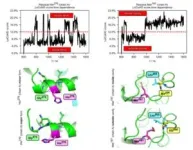(Press-News.org) In a new paper in Science Advances on May 29, researchers at JPMorgan Chase, the U.S. Department of Energy’s (DOE) Argonne National Laboratory and Quantinuum have demonstrated clear evidence of a quantum algorithmic speedup for the quantum approximate optimization algorithm (QAOA).
This algorithm has been studied extensively and has been implemented on many quantum computers. It has potential application in fields such as logistics, telecommunications, financial modeling and materials science.
“This work is a significant step towards reaching quantum advantage, laying the foundation for future impact in production,” said Marco Pistoia, head of Global Technology Applied Research at JPMorgan Chase.
The team examined whether a quantum algorithm with low implementation costs could provide a quantum speedup over the best-known classical methods. QAOA was applied to the Low Autocorrelation Binary Sequences problem, which has significance in understanding the behavior of physical systems, signal processing and cryptography. The study showed that if the algorithm was asked to tackle increasingly larger problems, the time it would take to solve them would grow at a slower rate than that of a classical solver.
To explore the quantum algorithm’s performance in an ideal noiseless setting, JPMorgan Chase and Argonne jointly developed a simulator to evaluate the algorithm’s performance at scale. It was built on the Polaris supercomputer, accessed through the Argonne Leadership Computing Facility (ALCF), a DOE Office of Science user facility. The ALCF is supported by DOE’s Advanced Scientific Computing Research program.
“The large-scale quantum circuit simulations efficiently utilized the DOE petascale supercomputer Polaris located at the ALCF. These results show how high performance computing can complement and advance the field of quantum information science,” said Yuri Alexeev, a computational scientist at Argonne. Jeffrey Larson, a computational mathematician in Argonne’s Mathematics and Computer Science Division, also contributed to this research.
To take the first step toward practical realization of the speedup in the algorithm, the researchers demonstrated a small-scale implementation on Quantinuum’s System Model H1 and H2 trapped-ion quantum computers. Using algorithm-specific error detection, the team reduced the impact of errors on algorithmic performance by up to 65%.
“Our long-standing partnership with JPMorgan Chase led to this meaningful and noteworthy three-way research experiment that also brought in Argonne. The results could not have been achieved without the unprecedented and world leading quality of our H-Series Quantum Computer, which provides a flexible device for executing error-correcting and error-detecting experiments on top of gate fidelities that are years ahead of other quantum computers,” said Ilyas Khan, founder and chief product officer of Quantinuum.
Read the full research paper here: https://www.science.org/doi/10.1126/sciadv.adm6761
About JPMorgan Chase
JPMorgan Chase & Co. (NYSE: JPM) is a leading financial services firm based in the United States of America (“U.S.”), with operations worldwide. JPMorgan Chase had $4.1 trillion in assets and $337 billion in stockholders’ equity as of March 31, 2024. With over 63,000 technologists globally and an annual tech spend of $15 billion, JPMorgan Chase is dedicated to improving the design, analytics, development, coding, testing and application programming that goes into creating high quality software and new products. Under the J.P. Morgan and Chase brands, the Firm serves millions of customers in the U.S., and many of the world’s most prominent corporate, institutional and government clients globally. Visit http://www.jpmorganchase.com/tech for more information
About Quantinuum
Quantinuum, the world’s largest integrated quantum company, pioneers powerful quantum computers and advanced software solutions. Quantinuum’s technology drives breakthroughs in materials discovery, cybersecurity, and next-gen quantum AI. With almost 500 employees, including 370+ scientists and engineers, Quantinuum leads the quantum computing revolution across continents. Quantinuum recently closed an equity fundraise anchored by JPMorgan Chase with additional participation from Mitsui & CO., Amgen and Honeywell, which remains the company’s majority shareholder, bringing the total capital raised by Quantinuum since inception to approximately $625 million.
The Honeywell trademark is used under license from Honeywell International Inc. Honeywell makes no representations or warranties with respect to this service.
END
JPMorgan Chase, Argonne and Quantinuum show theoretical quantum speedup with the quantum approximate optimization algorithm
Research showcases significant progress towards quantum advantage
2024-05-29
ELSE PRESS RELEASES FROM THIS DATE:
AI browser plug-ins to help consumers improve digital privacy literacy, combat manipulative design
2024-05-29
Researchers at the University of Notre Dame are developing artificial intelligence tools that help consumers understand how they are being exploited as they navigate online platforms. The goal is to boost the digital literacy of end users so they can better control how they interact with these websites.
In a recent study, participants were invited to experiment with online privacy settings without consequence. To test how different data privacy settings work, the researchers created a Chrome browser plug-in called Privacy Sandbox that replaced participant data with personas generated by GPT-4, a large language model from OpenAI.
With Privacy Sandbox, participants could ...
Grant funds CU project to develop novel mechanism to expand NF1 treatments
2024-05-29
The Gilbert Family Foundation has awarded data scientists in the Department of Biomedical Informatics (DBMI) at the University of Colorado School of Medicine $1.2 million to develop a microscopy assay and analysis pipeline for organoids derived from patients with Neurofibromatosis 1 (NF1), a complex rare disease that causes tumors to grow along nerves and produces a range of symptoms.
The project will help researchers develop more treatments for the disease, says DBMI assistant professor Gregory ...
A drying Salton Sea pollutes neighboring communities
2024-05-29
When desert winds stir up dust from the Salton Sea’s exposed lakebed, nearby communities suffer from increased air pollution. The deterioration coincides with reduced flows into California’s largest lake, a new research paper in the American Journal of Agricultural Economics finds.
Disadvantaged communities have been affected more than others in the areas near the Salton Sea, which has been shrinking for years, said the paper’s co-leading author Eric Edwards. He is an assistant professor of agricultural economics at University of California, Davis, who did the research while at North Carolina State University.
“We ...
Wild megalopolis: Study shows unexpected pockets of biodiversity pepper Los Angeles
2024-05-29
UCLA biologists have some good news and some bad news for lovers of urban wildlife in Los Angeles. The good news? Unexpected pockets of biodiversity pepper the city. The bad news? It will be a challenge to elevate the level of overall biodiversity of the city. Of all the major taxonomic groups studied, only snails and slugs are ‘easy’ to find in Los Angeles, probably because of the abundance of landscaping, gardens and irrigation.
The research points toward ways Angelenos — and people elsewhere — can make their city more hospitable not only to urban-tolerant species such as coyotes, but also to species that usually ...
Slugs and snails love the city, unlike other animals
2024-05-29
Most native species avoid more urbanized areas of Los Angeles, but slugs and snails may actually prefer these environments, according to a study publishing May 29 in the open-access journal PLOS ONE by Joseph Curti from the University of California, Los Angeles, and colleagues.
Urban areas continue to grow around the world, putting pressure on native species that find it difficult to tolerate the habitat changes and pollution it brings. To conserve and even increase biodiversity in cities, scientists and city planners need large-scale data on the ecological communities present, but this is time consuming and difficult to collect. Researchers used data from iNaturalist, a large ...
Ideas that cross international borders may have powerful impact on elections
2024-05-29
New simulations provide mathematical support for the theory that the spread of political ideas across international borders may have a big impact on election outcomes, and that small actions boosting a minority idea can gradually lead to global-scale political change. Jose Segovia-Martin and Óscar Rivero present these findings in the open-access journal PLOS ONE on May 29.
People in many regions around the world are increasingly exposed to international information—such as news and opinions shared via social media—allowing for the possibility of ...
YouTube’s comments section: Political echo chamber or constructive cross-partisan forum?
2024-05-29
The YouTube comments sections of politically neutral news outlets might be more conducive to cooperative, cross-partisan conversation than their liberal and conservative counterparts, according to a study published May 29, 2024 in the open-access journal PLOS ONE by Seung Woo Chae and Sung Hyun Lee from Indiana University. The study, which focused on the media response to the 2019 release of the Mueller report, found that more cross-partisan discussions took place on liberal channels than conservative ones and mainstream news outlets hosted more cross-partisan ...
Babies babble squeals and growls in clustering patterns observable from birth through the first year, suggesting this active vocal exploration is important to speech development
2024-05-29
In the first large-scale observation with human coding of infant vocalizations using all-day home recordings, babies of all ages from birth up to a year old squealed and growled in significant cluster patterns, suggesting the babies may have been actively engaged in noisemaking play and sound practice, according to a study published May 29, 2024 in the open-access journal PLOS ONE by Hyunjoo Yoo from the University of Alabama, Pumpki Lei Su from the University of Texas at Dallas, and colleagues.
In their first year of life, babies spend a remarkable amount of time vocalizing—both responding with noises to parents and caregivers, as well as self-directed babbling that could ...
The sweat bee, H. rubicundus, is less sociable in Scotland than in Cornwall, but is genetically differentiated and genetically isolated too
2024-05-29
The sweat bee, H. rubicundus, is less sociable in Scotland than in Cornwall, but is genetically differentiated and genetically isolated too
###
Article URL: https://journals.plos.org/plosone/article?id=10.1371/journal.pone.0302688
Article Title: Genetic differentiation at extreme latitudes in the socially plastic sweat bee Halictus rubicundus
Author Countries: Netherlands, UK
Funding: This work is part of a project that received funding from the European Research Council (ERC) under the European Horizon's 202 research and innovation programme (grantagreement no. 695744). RAB was funded by a Wageningen Graduate School Postdoctoral Talent fellowship and a BBSRC discovery ...
Smartphone use may help adolescents feel better - at least in the moment, finds real-time survey of US teens
2024-05-29
Smartphone use may help adolescents feel better - at least in the moment, finds real-time survey of US teens
###
Article URL: https://journals.plos.org/plosone/article?id=10.1371/journal.pone.0298422
Article Title: Real-world adolescent smartphone use is associated with improvements in mood: An ecological momentary assessment study
Author Countries: USA
Funding: This study used data from a larger project that was funded by a stand-alone research agreement between Facebook's Youth Research Fund (2018-2020, Facebook, Inc.) ...
LAST 30 PRESS RELEASES:
Korea University, Stanford University, and IESGA launch Water Sustainability Index to combat ESG greenwashing
Molecular glue discovery: large scale instead of lucky strike
Insulin resistance predictor highlights cancer connection
Explaining next-generation solar cells
Slippery ions create a smoother path to blue energy
Magnetic resonance imaging opens the door to better treatments for underdiagnosed atypical Parkinsonisms
National poll finds gaps in community preparedness for teen cardiac emergencies
One strategy to block both drug-resistant bacteria and influenza: new broad-spectrum infection prevention approach validated
Survey: 3 in 4 skip physical therapy homework, stunting progress
College students who spend hours on social media are more likely to be lonely – national US study
Evidence behind intermittent fasting for weight loss fails to match hype
How AI tools like DeepSeek are transforming emotional and mental health care of Chinese youth
Study finds link between sugary drinks and anxiety in young people
Scientists show how to predict world’s deadly scorpion hotspots
ASU researchers to lead AAAS panel on water insecurity in the United States
ASU professor Anne Stone to present at AAAS Conference in Phoenix on ancient origins of modern disease
Proposals for exploring viruses and skin as the next experimental quantum frontiers share US$30,000 science award
ASU researchers showcase scalable tech solutions for older adults living alone with cognitive decline at AAAS 2026
Scientists identify smooth regional trends in fruit fly survival strategies
Antipathy toward snakes? Your parents likely talked you into that at an early age
Sylvester Cancer Tip Sheet for Feb. 2026
Online exposure to medical misinformation concentrated among older adults
Telehealth improves access to genetic services for adult survivors of childhood cancers
Outdated mortality benchmarks risk missing early signs of famine and delay recognizing mass starvation
Newly discovered bacterium converts carbon dioxide into chemicals using electricity
Flipping and reversing mini-proteins could improve disease treatment
Scientists reveal major hidden source of atmospheric nitrogen pollution in fragile lake basin
Biochar emerges as a powerful tool for soil carbon neutrality and climate mitigation
Tiny cell messengers show big promise for safer protein and gene delivery
AMS releases statement regarding the decision to rescind EPA’s 2009 Endangerment Finding
[Press-News.org] JPMorgan Chase, Argonne and Quantinuum show theoretical quantum speedup with the quantum approximate optimization algorithmResearch showcases significant progress towards quantum advantage









